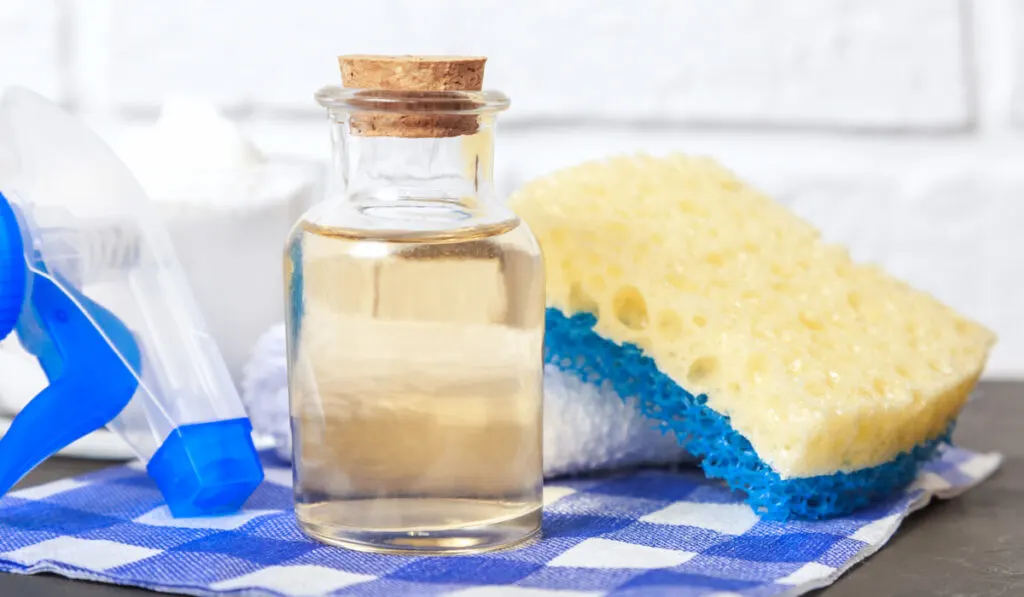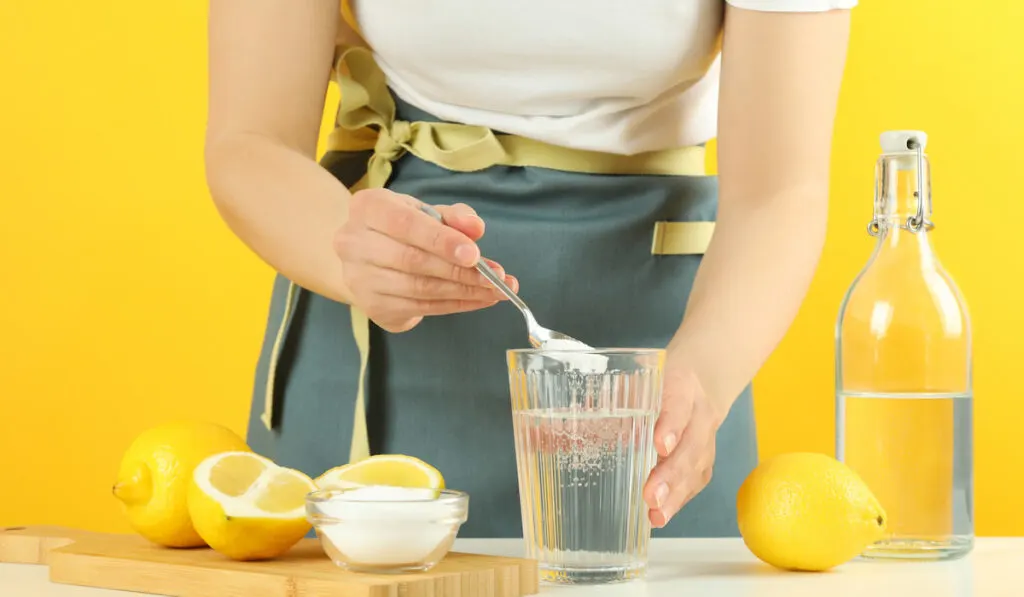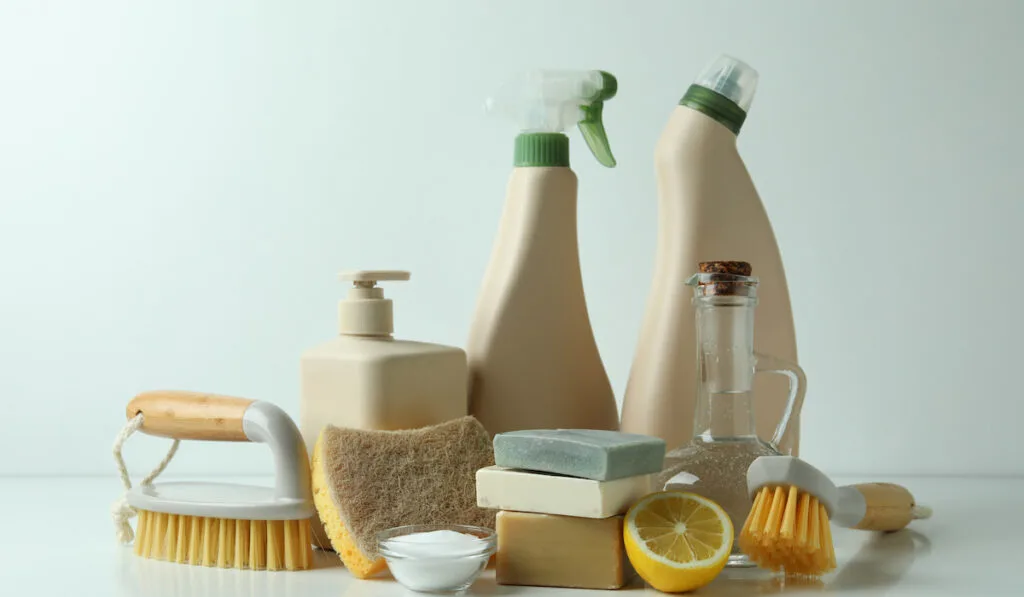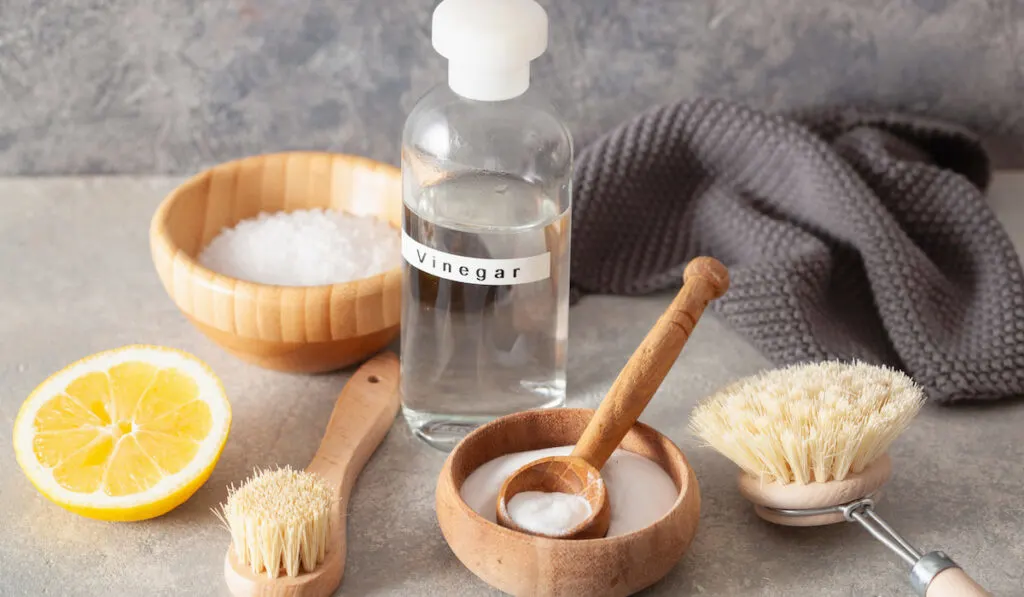*This post may have affiliate links, which means I may receive commissions if you choose to purchase through links I provide (at no extra cost to you). As an Amazon Associate, I earn from qualifying purchases. Please read my disclaimer for additional details.
You will never be short of tile cleaner options when you are trying to clean your tile floor. Nonetheless, you should be cautious not to opt for one that will damage your tiles.
Of the many tile cleaner options available, vinegar is considered to be one of the mild ones. So, it’s a good one to try out in place of the harsher options. Vinegar is basically a dilute solution of acetic acid (a weak acid). Being acidic, it will cut grime, mineral, and grease. But since it is diluted, any adverse effect on the tiles is mild.
Unsure of how to clean your tile floors with vinegar? We’ve got you covered. In this article, we discuss different methods of tile-cleaning with vinegar. We also answer questions related to cleaning tiles with vinegar.

Table of Contents
Can You Use Vinegar to Clean Tile Floors?
You can use vinegar to clean tile floors, but not all types. Vinegar is a multi-purpose non-toxic cleaner that cleans, deodorizes, and disinfects most hard surfaces safely. When your tiled floors are soiled, you can use vinegar to clean them and not worry about harsh fumes.
White vinegar is acidic, but while acids are typically harsh, white vinegar is not. Interestingly, its mildness does not stop it from being effective at dissolving hard water stains and grease.
Besides cleaning the tiles, when vinegar dries, it gives your floor a natural fresh scent. And you can improve this smell by mixing the vinegar solution with a few drops of essential oils before you start cleaning.
Vinegar is safe for ceramic, laminate, porcelain, and vinyl tiles. However, do not use it too often, or it might erode the floor’s finish. Once you use vinegar on tiled floors, ensure you dilute it with enough water or rinse the tile floor with water.
Will It Damage Ceramic Tile?
Vinegar will not damage your ceramic tiles.
Is There Any Type of Tile It Should Not Be Used On?
Vinegar should not be used on just any type of tile. The table below highlights the tiles you can use vinegar on and the tiles you should not use vinegar on:
| Types of Tile | Can Use Vinegar |
| Porcelain Tiles | Yes |
| Vinyl Tiles | Yes |
| Ceramic Tiles | Yes |
| Laminate Tiles | Yes |
| Wooden Tiles | No |
| Granite Tiles | No |
| Travertine Tiles | No |
| Marble Tiles | No |
| Unsealed Grout Tiles | No |
Will It Damage Grout?
Vinegar will damage grout. But this will only happen when the grout is unsealed. Vinegar will penetrate unsealed grout by seeping through the air spaces. Once it gets into these spaces, the vinegar begins to wear away the grout with time then eventually, it will wear off.
So, ensure you take do not use vinegar to clean any unsealed grout in your area.
It is necessary to check your grout every year to know if it requires sealing. Grout needs to be resealed to ensure it is immune to dirt, erosion, and spills.
How to Use Vinegar to Clean Tile Floors
There are several ways to clean tile floors with vinegar. Here are 3 different ways:
Method 1: Vinegar and Water

For this method, you will need the following:
- White Vinegar
- Bucket
- Warm Water
- Mop
- Broom Or Vacuum Cleaner
- Towel
- Sponge
Steps
- First, add 1 gallon of warm water and ½ cup of vinegar to a bucket and mix well.
- Next, sweep the floor with a broom or a vacuum to remove any mud, sand, dust, and any small particles that may scratch the surface of the tiles while you clean.
- After sweeping, dip the mop into the vinegar solution and start cleaning. Clean the tiles in sequence from top to bottom or side to side.
- When you clean bathroom tiles, you will need to use a sponge as well. Dip the sponge in the vinegar solution, then scrub to clean off any hard water stains. Once you are done cleaning with the sponge, wipe any residue off with a dry towel.
- When you are done cleaning, open the windows to allow fresh air into the room. It will help the floor dry faster, and before you know it, the smell of vinegar will be gone.
Method 2: Using Vinegar and Baking Soda for Tough Stains

If you want to clean a single area or a tough stain, use vinegar and baking soda. For this, you will need the following:
- Vinegar
- Baking Soda
- Mop/Rag
- Soft Bristle Scrubbing Brush
- Water
- Container
Steps
- Start by creating a mixture of vinegar and baking soda in a container. You can decide on the measurements yourself but what you want is a thick paste.
- Next, put the paste on the area with the stain and use your brush to scrub gently.
- Rinse the area with water and if necessary, repeat the process.
Method 3: Mixture of Vinegar and Dawn Dish Soap

To use vinegar and dawn dish soap, you will need the following:
- Broom
- Dawn Dishwashing Soap
- White Vinegar
- 5 -Gallon Water Bucket
- Mop
- Sponge Or Soft Brush
- Spray Bottle
Steps
- Start by using a broom to clean the room and get rid of all the dust.
- Next, fill the bucket up with warm water. The water needs to have boiled for at least 15 minutes.
- Pour 1 cup of vinegar and 2 tablespoons of Dawn dishwashing soap into a spray bottle. Pour the leftover vinegar into the bucket containing the warm water and mix it well.
- Use the spray bottle to spray the vinegar and dawn soap mixture on the floor. Use your mop to scrub the floor gently.
- To clean spots, use a scrubber or soft brush.
- Mop the floor gently with warm water, vinegar, and soap. Then when you are through, leave it for about 10 minutes.
- Lastly, using a mop and clean water, rinse the floor thoroughly. When you are done rinsing, your tile floors should be squeaky clean.
3 Vinegar Recipes for a Squeaky Clean Floor

Although mopping and sweeping of tile floors have become part of regular home cleaning, they might not be enough to prevent your tiles from getting dull and dirty.
Tile floors sometimes require that extra bit of care to ensure they remain shiny. To achieve this, you can try out any of the following vinegar recipes for a squeaky clean floor:
Vinegar and Baking Soda Scrub
This recipe is ideal for removing tough stains on tile floors. For this DIY recipe, you will mix the following:
- 1 tablespoon liquid dish soap
- ¼ cup baking soda
- ¼ cup white vinegar
- 2 gallons of warm water
If you want a fresh scent after cleaning, you can add a few drops of lavender essential oil.
Minty Wash
- For this recipe mix, equal parts white vinegar with water and rubbing alcohol.
- Next, add ½ teaspoon of liquid dish soap and some drops of peppermint essential oils.
This recipe works well with either a spray bottle or a bucket as the dispenser. Then, the peppermint oil in the mixture deters mice and ants as a bonus.
Laminate Floor Cleaner
Laminate floors are a bit sensitive to moisture when compared to other tiles. So, to prevent early discoloration and peeling, you need a laminate cleaner that is gentle.
The recipe for this cleaner includes the following:
- 1/4 cup distilled white vinegar
- 1/4 cup distilled water
- 1/4 cup 190-proof alcohol
- A few drops of essential oils.
White vinegar and distilled water reduce any chance of streaks, while the alcohol gives your floor extra protection from microbes.
The rubbing alcohol and vinegar mixture in this recipe creates an aroma that is sharp and aggressive. To cover up this aroma, you will need to add essential oils to the mix.
Final Take
Using vinegar to clean your tile floor is a non-toxic and effective way to remove stains, scum, and grime.
Although the use of vinegar to clean floors is encouraged, you should use it in moderation because it is acidic.
Resources
- https://cleaning.lovetoknow.com/floor-cleaning-tips/how-clean-tiled-floors-vinegar
- https://rainbowintl.com/blog/5-natural-ways-to-clean-your-tile
- https://homeguides.sfgate.com/use-vinegar-cleaning-porcelain-tile-floors-30205.html
- https://fantasticservicesgroup.com.au/blog/how-to-make-your-floor-tiles-sparkling-clean-with-vinegar/
- https://www.ceramices.com/how-to-clean-ceramic-tile-floors/
- https://groutmagnificent.com/does-vinegar-ruin-grout/
- https://www.edensgarden.com/blogs/news/5-natural-homemade-floor-cleaner-with-essential-oils
